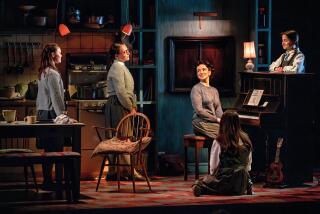Shallow stereotypes live in âBeverly Hillsâ
God, they say, is in the details, but reading âBeverly Hills Adjacent,â one canât help but feel that plot helps too.
A bit like âLittle Childrenâ gone Hollywood, âBeverly Hills Adjacentâ is so front-loaded with details it almost collapses: Itâs not just a cupcake from Sprinkles, itâs a red velvet cupcake from Sprinkles; a character didnât just wait tables when she came to L.A., she waitressed at Kate Mantilini.
Such specificity is not surprising. The book is co-written by Jennifer Steinhauer, Los Angeles bureau chief of the New York Times, and Jessica Hendra, author of the memoir âHow to Cook Your Daughter.â While a little local accuracy adds flavor here it often threatens to consume the 50-calorie hot chocolate story line.
Itâs pilot season and Mitch Gold, a working actor, is again driving his wife June, a UCLA poetry professor, crazy.
This is a terrific setup -- pilot season is a true only-in-L.A. situation (unlike traffic, smog and plastic surgery, which have become depressingly universal). Like the blooming of the jacaranda, the annual frenzy that seizes the television world as networks decide which pilots to put into production still manages to shock the system.
Unfortunately Hendra (who is married to actor Kurt Fuller) and Steinhauer run this fun premise through a very familiar wringer, giving us cliched potshots and an over-abundance of anecdotal scenes. Thereâs a lot of action in âBeverly Hills Adjacentâ but not much happens.
Although Mitch is regularly cast as a lead and he still makes his 40-grand-per-episode quote (a situation many actors these days would kill for), he is an actor and so feels persistently tenuous. Every audition is filled with anxiety, envy and occasionally controlled substances. What they are never filled with is decent people. Back-stabbing agents, bitchy casting directors, soulless executives, pathological screenwriters -- Mitch knows neither angel nor muse.
The Hollywood novel was, of course, built on the rather pleasing revelation that the glamorous, with their lovely faces, swell cars and swimming pools, are in fact insecure, narcissistic loony toons, made so by the corruptive force of the industry. But while this was news for Nathanael West, Evelyn Waugh and even Michael Tolkin and David Freeman, it is decidedly less so now. Now we have Us magazine and Perez Hilton, now we have âEntourageâ and âThe Hills.â
If overfilled with wacky incidents and freeway details, the Mitch portion of âBeverly Hills Adjacentâ does capture the often maddening nature of the acting life -- the endless auditions, the last-minute changes, the strange wrong-headed caste (not to be confused with casting) system, the minefields of memory and desire.
June is not so lucky. Although she is a poetry professor -- again, a promising conceit -- she spends her time facing down the most over-used foil of the 21st century -- the yoga-pants-wearing, sugar-and-wheat-eschewing, play date-excluding Monster Moms that run the power-kindergarten her daughter attends. The Real Housewives of Beverly Hills Adjacent.
As a woman and a mother, I am begging, on my knees, that we stop with the Rich Mom bashing. I know that in these politically correct times the pool of those we can lampoon and excoriate has become a mere puddle. But as exasperating as they may be, rich stay-at-home mothers cannot bear the weight of a nationâs anger (especially because theyâre so thin.) Oh, it isnât fair to blame Steinhauer and Hendra for following a well-trod and commercially successful path, but why they chose to show June struggling against a few Escalade-driving Monster Moms instead of the Medicis who wander the halls of academe, is beyond me.
Except I know why. For the same reason their Hollywood does not have a single nice, inspiring or even marginally complex character in it. Because thatâs what sells books. June is simply a stand-in for the rest of us who want reassurance that other moms are mean, marriage is hard and Hollywood is a terrible, terrible place. Outside of her job, June has no interests (and little enough interest in that). Because no one of substance lives in Los Angeles, Juneâs two best friends (one of themâs gay!) live in New York. So itâs hard to sympathize, or even care, when June finds herself drawn to the male half of a married writing-producing team simply because he knows a good Auden poem or two.
The most frustrating thing about âBeverly Hills Adjacentâ is that the writing is so consistently good, at times lyrical, and there are some very funny scenes and memorable characters -- Juneâs many automotive mishaps, Mitchâs encounters with the playwright who once stalked him but is now super-hot in Hollywood, his rivalry with another actor who is invariably also up for his parts, all of which makes a reader wish very hard that Steinhauer and Hendra had done a better job of ignoring formula and written what they actually know.
Not predictable âTinseltownâ anecdotes and marketable versions of people theyâve met, but what theyâve actually learned from living in Los Angeles. Because, like it or not, Hollywood is more than just a collection of egos jockeying for power and money, just like a novel is more than just a set of scenes.
No matter well-observed and meticulously detailed they may be.
--
mary.mcnamara @latimes.com
More to Read
Sign up for our Book Club newsletter
Get the latest news, events and more from the Los Angeles Times Book Club, and help us get L.A. reading and talking.
You may occasionally receive promotional content from the Los Angeles Times.








